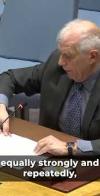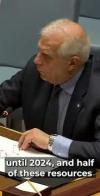EU & Multilateralism at work in Vienna
"It is our collective responsibility to work towards a more peaceful, secure and prosperous world for present and future generations. The EU, together with its Member States, will continue to strengthen partnerships, to uphold and promote international law and fundamental rights, to support peace and democracy, to stand side-by-side with people in need all over the world. We will continue to be a principled, reliable, consistent and cooperative global player, a point of reference for multilateralism."
Federica Mogherini, High Representative of the European Union for Foreign Affairs and Security Policy
The European Union's commitment to effective multilateralism, with the United Nations at its core, is a central element of the EU’s external policy, as set out in the EU Global Strategy for Foreign and Security Policy. This efficient multilateral system, founded on universal rules and values is crucial to respond successfully to common challenges and pursuing common goals of the international community, of which the European Union is an integral part and a major player.
Vienna is one of the capitals of multilateralism and global cooperation and the Delegation of the European Union in Vienna represents the EU not only at the UN, its Agencies and the International Organisations but also to the Organisation for Security and Cooperation in Europe (OSCE).
The Council Conclusions 10341/19 on "EU action to strengthen rules-based multilateralism", adopted on 17 June 2019, states that the EU aims to create an effective multilateral system delivering results in tackling today's and tomorrow's global challenges. Strengthening the multilateral system will be based on three strands of action: (1) Upholding international norms and agreements; (2) Extending multilateralism to new global realities; (3) the EU and its Member States will support necessary reforms and modernisation of multilateral institutions.
The European Union is the leading engine and defender of rules-based sustainable multilateralism. The EU is and will continue to lead in implementing and upholding international norms and agreements that provide global public goods and protect future generations. The EU demonstrates leadership in pursuing an innovative agenda in areas in need of strengthened multilateral governance or where new challenges require collective action, taking advantage of the EU's normative capacity, autonomy and influence. The EU is also the global point of reference for all those who want to preserve reform and expand multilateralism and will support necessary reforms and modernisation of multilateral institutions.
The European Union is strongly committed to the overall framework of the 2030 Agenda and its 17 Sustainable Development Goals (SDGs), which is part of the EU's identity. The SDGs are a universal call for action to end poverty, protect the planet and ensure that all people enjoy peace and prosperity. The EU is determined to protect the planet from degradation, so that it can support the needs of the present and future generations. The EU promotes peace, security and stability, and is amongst the strongest supporters of democracy, human rights, good governance, and the rule of law. The EU is strongly supporting social and human development, including by giving priority to social protection, decent work, universal health coverage and access to education in its development cooperation and has made achievements with regard to gender equality, the empowerment of women and girls and addressing violence against girls and women. The EU supports climate change mitigation and adaptation, environmental protection and the sustainable management and use of natural resources.
The European Union is committed to work TOGETHER with its partners to tackling global challenges. This has always been EU’s approach to international relations: putting international cooperation based on rules, peace and diplomacy at the centre. This approach is often described as multilateralism, which is working together with old and new partners around the world to deliver on shared goals and ambitions, and on citizens' expectations.




